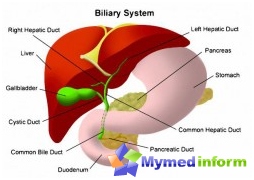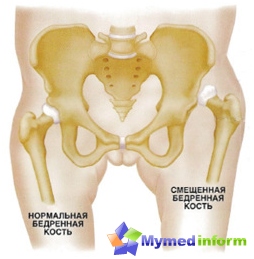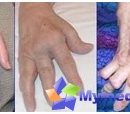Today, our site will tell our parents in detail about the Rotavirus infection, which occupies a special place in the group of acute intestinal diseases. You will learn about typical symptoms, reasons for the occurrence and methods of treatment.
Overview of the disease
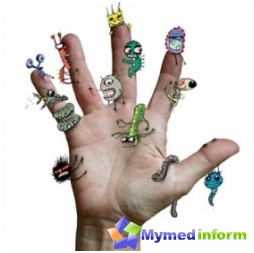
To date, rotavirus infection is considered the most massive intestinal infection in all territories of the world. And the younger than the child, the greater the risk of the occurrence of this intestinal pathology.
An abbreviated infection is called RVI, there is a disease and synonyms: intestinal flu, rotavirus gastroenteritis, rotavirosis, gastric flu. The causative agent of this acute form of intestinal infection is rotaviruses. In appearance they look like a wheel with spokes and rim. On Latin the wheel means «Rota», so viruses and got such a name. Thanks to the three-layer capsule, these viruses are resistant to external environmental factors. Statistics in Russia shows that 93% of cases of infection fall at the cold season (November-April). The largest outbreaks are fixed during the flu epidemic.
Most often, the diseases suffer from kids aged from six to twelve months, but there are cases of morbidity and other age categories. Usually adults pick up RVIs when they take care of the sick baby.
How the disease is developing?
The source of infection can be directly the sick person or the one who wears this virus. Once on the mucous surface of the gastrointestinal tract, Rotavirus begins to actively multiply in its cells. Then it stands out to the external environment with a feet. This happens from the first days as soon as the characteristic symptoms appeared, which we will also tell. The main transmission mechanism occurs through food, water, dirty hands, contact with the carrier of the virus. In children's teams, this virus provokes outbreaks of acute diarrhea, in other words, diarch. Having affecting the gastric mucosa and small intestine, the virus causes pathology called gastroenteritite. With inflammation of the mucous membrane of the gastrointestinal tract, the process of digestion of food is disturbed, which leads to a strong diarrhea. And this is fraught with dehydration of the body.
Characteristic symptoms
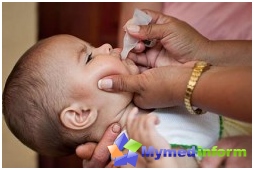
Some specific treatment with antiviral means of the RVI does not exist yet. The fight against the virus is the task of immunity (passive and active). It should be referred to a doctor so that it gives competent recommendations, prescribed symptomatic therapy, followed the state of the patient after the diagnosis. The diagnosis is specified using modern laboratory studies, for example, immunochromatographic test, electron microscopy, diffuse precipitation.
The first days of the illness of the child should be held in bed.
So that there is no dehydration, the sick child need to give every twenty minutes to drink in small portions, usually on the tablespoon. Try to alternate liquid, for example, give a spoonful of boiled water, then a spoonful of salty, then, tea, infusion of herbs, rice decoction. The amount of fluid will help calculate the doctor, it directly depends on the age of the baby, the volume of lost liquid. If the weight of the baby is about eight kilograms, then liquids should be given 800 milliliters. From salty solutions can be given a regiment, glucosolyan. But in the tour there is also a useful chamomile extract. Infusions and extracts from daisy flowers Pharmacy perfectly disinfect intestines, painted pains, inflammation.
The doctor can assign a smect, Activated carbon.
In the first days of the disease you can not give the child enzyme preparations. They include proteases, they contribute to the introduction of rotaviruses in the epithelial cells of the mucous membrane of the intestinal tract.
When RVI patients are very poorly tolerated cow's milk. This is due to the fact that the synthesis of the enzyme needed to split the milk sugar is sharply reduced in the small intestine. If milk sugar is accumulated in the intestines, it will lead to a frequent liquid chair. Therefore, try to exclude the disease of the milk from the diet. Breasts also need to reduce the share of the use of maternal milk - such is the opinion of experienced doctors involved in the study of infectious pathologies. From artificial mixtures, preference is a brine or lowolate.
Do not forcing the child to eat if he refuses meals in the first days. Make porridge on water, apple compote. But fresh fruits, vegetables, fish and meat dishes, sugar better exclude from power.
With heavy and medium-stage forms of RVI, the baby is hospitalized in a children's hospital. Here a small patient will enter parenterally «Trisol», «Gloss», Glucose solutions.
Sometimes immunoglobulin preparations are prescribed.
The benefits bring probiotics - lacto and bifidesbacteria.
Antibiotics Appointed only in mixed cases of the disease, when bacteria also join viruses.
Preventive actions

Be sure to comply with the elementary rules of personal hygiene, isolate during the treatment of the patient in a separate room to avoid infection of other family members.
Pediatricians strongly recommend making vaccinations to kids to avoid rotavirosis. To this day there are 2 oral vaccines, that is, administered through the mouth, which have passed the necessary clinical trials.
These statistics suggest that about 25 million cases of intestinal flu are registered in the world. Approximately 3.6% of cases (this is 600-900 thousand) ends with a fatal outcome. Be sure to contact the doctor with the above-described symptoms and suspicions of rotavirus infection, do not self-medicate. Our site wishes to their readers and their family and close health!



